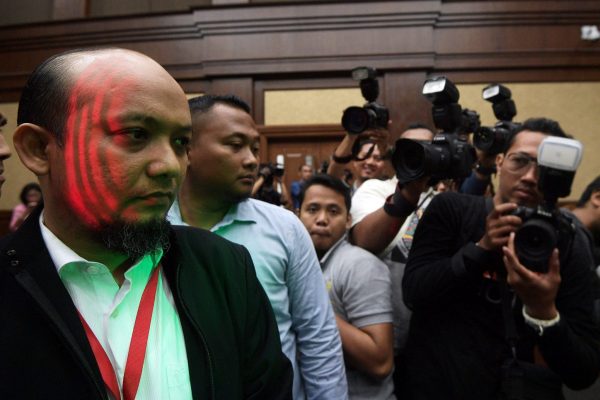He momentarily seemed to have extricated himself from the e-ID case too. Then, when Indonesia’s anti-corruption body began to close in, he was rushed to hospital after being involved in a mysterious car accident. But now, Novanto is standing trial on charges related to the e-ID case. His lawyer and doctor have been detained amid allegations of professional malpractice related to the car accident.
It is important to look beyond these twists and turns due to the sheer size of the scandal surrounding the e-ID card scheme — a project that aimed to provide compulsory biometric identification cards to all Indonesians. The misallocation of funds for the scheme was notable for the scale of corruption and for the number of people potentially involved. The KPK (a government agency established to fight corruption) estimates that 2.3 trillion Indonesian rupiah (approximately US$170 million) was siphoned off from the project — approximately two fifths of the scheme’s total budget. Prosecutors’ documents indicate that dozens of members of the People’s Representative Council (as well as other officials) accepted this money.
The scandal is compounded by other problems that have beset the e-ID card scheme as well as by ongoing irregularities with public procurement practices. The e-ID card scheme dominated public complaints received by the Ministry of Home Affairs and in some areas the frustration of citizens queuing at government offices boiled over into pushing and shoving. The case is one of a seemingly unending stream of corruption scandals involving public procurement. Indonesian Corruption Watch estimates that public procurement accounts for around two fifths of all corruption cases in Indonesia.
The scandal does not directly impact President Joko Widodo because the events being investigated occurred before he took office. But an effective resolution to the case is still important for the President’s credibility given his emphasis on clean and efficient government. Recent opinion polls show the President’s approval rating holding up and have even pointed to slightly improved perceptions of the government’s approach to corruption. But the sheer number of suspects involved in the e-ID card case means it is likely to linger on and may begin to drag on the President’s approval numbers.
The ongoing case could also weaken Indonesia’s governing coalition. Minister of Industry Airlangga Hartarto has replaced Setya Novanto as leader of Golkar, and the party seems set to stay supportive of the President going into the next presidential election. But polling figures indicate that the scandal surrounding Novanto has sapped public support from Golkar. Airlangga, who is a personal friend of Novanto, will have to strike a delicate balance between cleaning up Golkar’s image and avoiding a disruption to the party’s operations ahead of the 2018 and 2019 elections.
More worrying for the President are the number of high–profile members of his Indonesian Democratic Party of Struggle (PDI-P) who have been named in indictments relating to the case. The strong presence of the PDI-P within the parliamentary committee investigating the KPK makes matters worse, since the enquiry is riddled with conflicts of interest and is widely seen as an attempt to weaken the KPK. With Golkar making critical noises about the inquiry under its new leadership, the PDI-P looks increasingly isolated.
The e-ID case is also an important test for the KPK. If it succeeds in following through on the case it will refute criticism that the agency has struggled to prosecute high-level officials. The stakes are particularly high in the e-ID case given the climate of intimidation against those seen to be uncovering foul play. A key witness, who later committed suicide, reported fearing for his safety. Another important witness withdrew a statement which implicated other members of the People’s Representative Council amid suggestions that other lawmakers had pressured her to keep quiet. Novel Baswedan (pictured), a KPK investigator who had been working on the case, was the victim of an acid attack by unknown assailants.
In the long term, the scandal is a warning about the vulnerability of Indonesia’s democracy. It is a further blow to the image of the People’s Representative Council — which is already seen as one of the country’s most corrupt and least well-regarded state institutions. The dangers for democracy are all the more apparent given how close Prabowo Subianto came to the Indonesian presidency in 2014 while openly stating his opposition to electoral democracy.
Gerindra (Prabowo’s party) has stayed aloof from the parliamentary enquiry into the KPK and is relatively less exposed to the e-ID card scandal than some of those in the governing coalition. In a case with many losers, Prabowo could end up being one of its beneficiaries.
Matthew Woolgar is a PhD student at the University of Oxford. He is currently conducting research on the party system in post-independence Indonesia.

